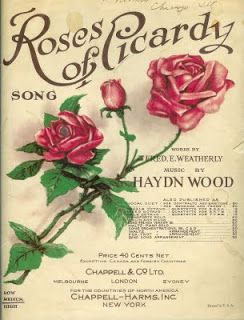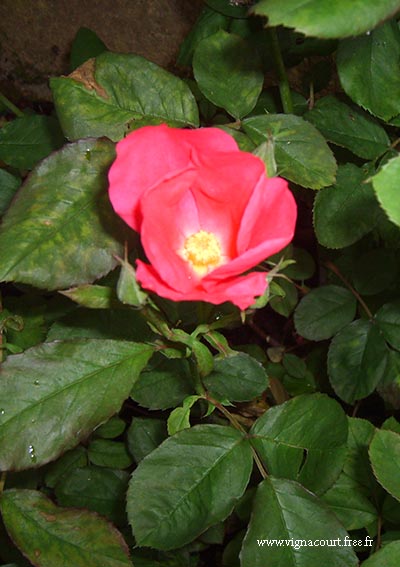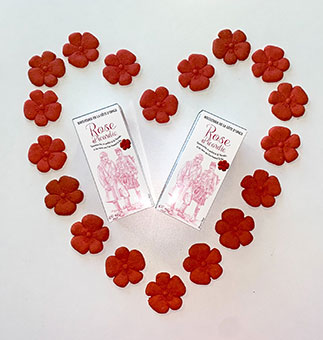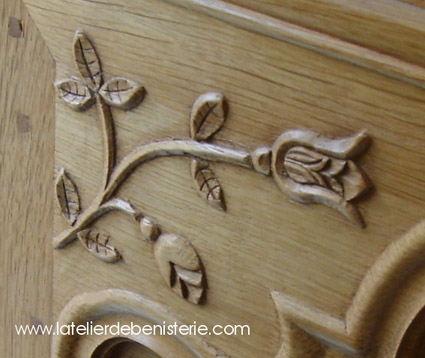Home > Heritage > Rose of Picardy
Roses of Picardy
Roses of Picardy is a song whose music was composed by Haydn Wood. The rose of Picardy is a variety of rose developed by an English horticulturist. The Rose of Picardy is also a flower carved in the wood, and finally, this is the name of a biscuit.
![]()
The Song
Roses of Picardy is the title of a famous song created in 1916 and translated into several languages, including the language of Picardy. According to legend, the song tells the story of the meeting of a British soldier and a Picardy lady.
Frederic Edward Weatherly, who wrote the lyrics, was an English lawyer, and Haydn Wood, the composer, was an English violinist and conductor. Charles-Maurice Siville, alias Pierre d'Amor, translated the French version, released in 1918.
It had been performed by talented musicians, such as Sidney Bechet on the clarinet in the jazz version and Jean-Pierre Bertrand on the piano in the boogie version, and sung by Yves Montand, Tino Rossi, Franck Sinatra, Mario Lanza, and more recently by Nathan Lay, an opera singer.

The flower
David Austin was a renowned rose grower who created the rose in 2004. His company is based 15 miles northwest of Birmingham. It is a pink-red rose with yellow stamens. The sweetbriar is a wild rose of ancient origin. There are several varieties around the world.
The word sweetbriar would be a distortion of the French word bruyère, meaning heather. (a shrubby cousin of rose hips).
The Duchess of Gloucester named this rose for the centenary of the Entente Cordiale in the gardens of Valloires, near the Bay of Somme. Louis-Philippe desired this rapprochement between England and France, which gave rise to several visits, first that of Queen Victoria in 1843 at the Eu castle in Normandy and later that of King George V in 1914 in Paris. This arrangement materialized with the signing of agreements in 1904 in London whose purpose was to end territorial and colonial disputes.

Rose of Picardy
Rose Picardy Biscuit
The Rose of Picardy biscuit was created one year after the centenary of the armistice of the Great War. It was carried out with local products by the 'Côte d'Opale' biscuit factory in Boulogne-sur-Mer.
This biscuit is a shortbread cookie with the natural aromas of rose and strawberry, which gives it an exceptional taste!


Photos credit of "Biscuiterie de la Côte d’Opale" in Boulogne-sur-mer.
The Sculpture
A Picardy rose is one of the sculptures on the sideboard made in the village since 1860. Nature has been an inspiration for a long time. There are other models of this low sideboard, but the model with the rose carved is an emblem of regional furniture. For more information, see this link: Vignacourt sideboard.
English Lyrics
She is watching by the poplars,
Colinette with the sea-blue eyes,
She is watching and longing and waiting
Where the long white roadway lies,
And a song stirs in the silence,
As the wind in the boughs above,
She listens and starts and trembles,
This is the first little song of love.
Roses are shining in Picardy,
In the hush of the silver dew,
Roses are flowering in Picardy,
But there's never a rose like you!
And the roses will die with the summertime,
And our roads may be far apart,
But there's one rose that dies not in Picardy,
'This the rose that I keep in my heart
And the years fly on forever,
Till the shadows veil their skies,
But he loves to hold her little hands,
And look into her sea-blue eyes,
And she sees the road by the poplars,
Where they met in the bygone years,
For the first little song of the roses,
Is the last little song she hears:
Roses are shining in Picardy,
In the hush of the silver dew,
Roses are flowering in Picardy,
But there's never a rose like you!
And the roses will die with the summertime,
And our roads may be far apart,
But there's one rose that dies not in Picardy,
This is the rose that I keep in my heart.

